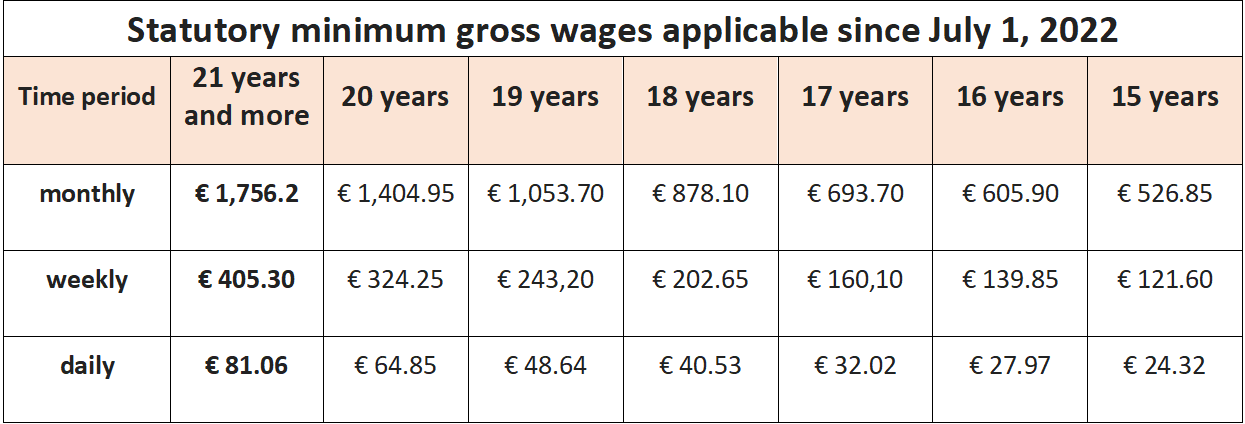When looking through job offers abroad, you must have come across, on several occasions, the expressions job outside the minimum wage per age system or offer without an age-dependent pay limit. What exactly is this minimum wage per age system and what impact does it have on your pay? Who does the Dutch minimum wage per age system apply to? You will find answers to these questions in the following article.
What is the minimum wage per age system?
The minimum wage per age system is a statutory pay system according to which wages increase with the age of the employee. It sets the minimum wage that a minor worker must receive for work performed in the country where the system is in place.
The minimum wage per age system applies to all workers in the Netherlands, regardless of whether they were born there or not. It allows employers to legally pay less to workers who are under 21.
Importantly, the minimum wage per age system does not regulate the top limit of the employee’s remuneration. It is up to the employer to decide whether to pay minors at the statutory rates or to pay them full wages (as in the case of those over 21).
Where does the minimum wage per age system apply?
The age-dependent pay scale was invented by the Dutch. Initially, the Dutch minimum wage per age system applied to workers up to the age of 23.
In July 2017, the age limit was lowered from 23 to 22. Two years later, the age threshold was reduced to 21, so young workers can now enjoy higher wages.
Why was the minimum pay per age system created?
There are two key reasons for this special pay system.
First, as a result of a deliberate systemic solution, the employment of minors in the Netherlands is made less profitable. Lower hourly wages for young people are intended to be an incentive for them to continue their education after secondary school rather than take up a job. Dutch citizens can legally work from the age of 15. Thanks to the minimum pay per age system, a worker with several years’ experience will earn a few euros more per hour than a 15-year-old with no qualifications.
Secondly, the increase in earnings with age is expected to make those already employed in a particular company less likely to start looking for a new employer. The system is designed to reward older, more experienced workers.
Earnings of workers under 21
In many cases, people working in the Netherlands who are not yet 21 years old earn around 40-45% less than their older counterparts. Thus, in 2022, a 17-year-old Dutch person working full-time will earn 693.7 EUR per month, while a 20-year-old in the same position will earn 1,404.95 EUR.
Remember that this is a minimum wage. A significant proportion of employers in the Netherlands offer higher than minimum wages, which also translates into wages earned by under 21-year-olds.
In addition, when working in Holland, you can count on various allowances and bonuses to your salary, for example for meeting targets or long-term service. Some companies pay their employees the same rate, regardless of age.
Minimum wages in the Netherlands
In the Netherlands, as in most European countries, there is a minimum wage. The statutory minimum wage, adjusted twice a year (in January and July), depends on the age of the worker.
Since the beginning of July 2022, there have been new minimum pay rates in the Netherlands (Table 1).


Hourly wages in the Netherlands
There is no set single weekly working time standard in the Netherlands. Depending on the industry, the working time ranges between 36 and 40 hours per week. The working time standard for supermarket jobs is 40 hours per week, while in greenhouses or the hotel and catering industry, it is 38 hours.
The table below shows the minimum hourly rates applicable since July 2022.


Will the Netherlands abolish the minimum wage per age system?
For many years, the applicable age-dependent rates have been a contentious issue in the Netherlands. The opinion that the system is unjust and discriminating is gaining ground among many young Dutch people, as well as political activists. Year after year, however, the situation for workers is becoming better, with an increase in the minimum wage in the Netherlands. It can therefore be expected that the minimum wage per age system will be completely done away with in the future.
Job opportunities in the context of the Dutch minimum wage per age system
In the Netherlands, even young people without work experience can find a good job. Such workers can find jobs in greenhouses and sorting plants, in food production, or large logistic warehouses, and those who can communicate in English have the opportunity for rapid career advancement. When browsing job offers in the Netherlands, it is advisable to check the applicable hourly rate in the job advert.
Examples of job offers without the minimum wage per age:
- ornamental plant packer
- potted flower production worker
- meat production worker
- industrial laundry worker
- greenhouse worker – tomato or pepper harvesting
- tomato sorter
- warehouse worker/order picker
- greenhouse closure help.
Every year, thousands of young Poles go to work in the Netherlands with the main reason for their emigration being the attractive Dutch salary system. The positions offered there vary in terms of location, length of employment, and hourly wages.
Despite the Dutch minimum wage per age system, wages here are still much higher than the minimum offered in our country. A manual worker with no experience or knowledge of a foreign language can earn several times more in the Netherlands than in Poland. There are also more and more job offers where the age-dependent limit doesn’t apply.

















